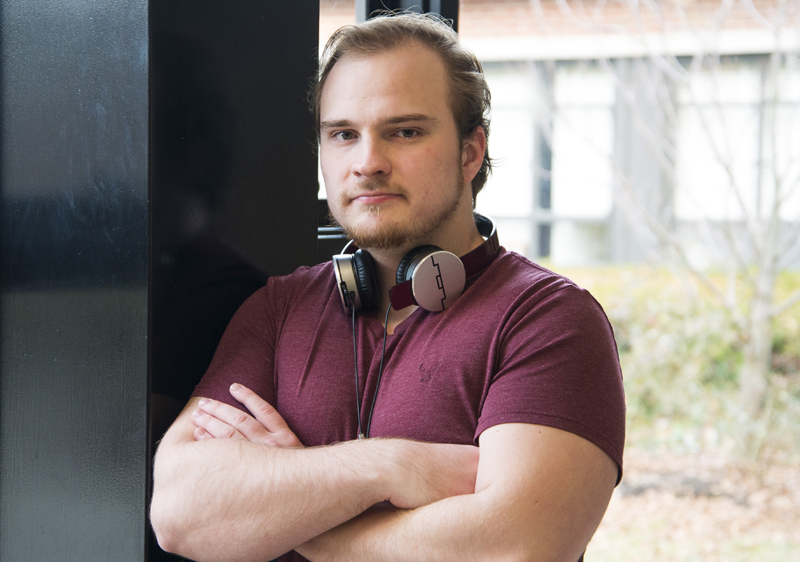Harpur student spotlight: John Petersen
Senior uses mathematics skills to help compose music

From business to law to medicine, a degree in mathematics can take you a long way. For John Petersen, studying math has been an invaluable tool in pursuing his career as a musical composer.
“I use applied calculus and algebra to figure out how to get the desired effects and sounds out of material I have,” Petersen said. “Processes like pitch shifting, auto ducking and time stretching all make use of single and multi-variable calculus that’s applied to soundwaves.”
Petersen is a senior math and music double major at Binghamton University. He hopes to blend the languages of both disciplines to create pieces that are both analytical and abstract.
Sometimes, he said, he sees the process of creating music like an algorithm.
“You take an input, like my headspace or what I’ve been listening to lately or something that really impacted me, and you get an output, which is the music,” he said. “It’s a pretty cut-and-dry way of putting it, and probably ‘too mathematical’ or ‘not artistic enough’ for many people, but everyone undeniably has a process. I just enjoy studying that idea and using it to inform and vary my music.”
Taking a mathematical approach to composition has helped Petersen work alongside peers, because he believes his strength in problem-solving has been grounding for him and his classmates.
“There are many times when I’m in a group lesson and someone has a question and they don’t know what to do in their music,” he said, “and I’ll use the problem-solving that I got from my math classes to help them out.”
Balancing the concrete with the abstract has taught the Huntington, N.Y., native to keep an open mind when composing. Having too much control over his pieces can sometimes be more harmful than helpful.
“I will go note by note and write in a tempo for each to make sure that things slow down and speed up the exact amount,” Petersen said, “and I put way too many dynamic markings because I want people to know how things are shaped. But I like to balance that mathematical control with the same amount of not having control, by maybe not writing as much and seeing what the player does.”
Petersen truly learned the value of control after falling ill during his senior year at Binghamton University and having to take time off of school to focus on his health.
“I couldn’t make it out of bed a lot of days, and I didn’t know what to do with myself in a long-term way,” he said. “I also didn’t have people to play my music. If I’m in school I can ask people to play my music. There are opportunities to perform. But I couldn’t have that done.”
As a solution to both of these problems, Petersen started creating electronic music. Immersing himself in the electronic world proved to be one of the most productive periods of his life, he said, as he composed over an hour of music from his bed.
One of his electronic pieces, titled “Life,” includes a distant, lyrical clarinet improvisation which he played himself, overlaid with a sample of boxer Muhammad Ali’s “I’ll Show You How Great I Am” speech.
“To me, Ali was declaring victory over those who look down on people with less privilege. He fought against a system designed to marginalize him,” Petersen said. “It’s a stark contrast to the mellow clarinet in the background, against the reality of life for many people in America. Everyone fumbles through life — only having one shot, which is all I gave myself when recording.”
While Petersen often writes about the human experience, he hopes to someday be a video game composer. His interest in video games, film and anime have blended with his aptitude for electronic music.
Petersen believes that these types of music are underrated in academic circles, but he knows he has his professors’ support.
“The teachers really do want to help the students and are very dedicated. My Number Systems teacher (Adam Allan) and my Linear Algebra teacher (Jaiung Jun) were both fantastic,” Petersen said. “Everyone does try really hard, and it’s crazy because they’re students themselves and they’re doing their own stuff. But they’re doing a great job handling it.”
To Petersen, overcoming life’s hurdles goes back to Ali’s empowering message that he used in his composition.
“Many people can’t get out of their bed for days, weeks or months at a time. Many people are born into impoverished communities that impact the rest of their lives. Many people become victims of violence or other forms of abuse that mangle their lives,” Petersen said. “Ali’s crisp and booming delivery is like trumpets, heralding the fact that there will come a time when love becomes prevalent.”

